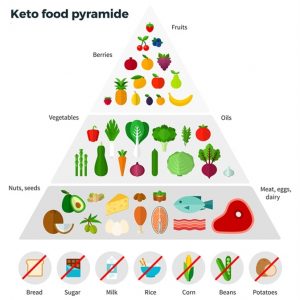Strap on your running shoes and fuel up – it’s time to explore the science behind the popular ketone-based diet. Discover the hidden potential your body has to unlock energy and health-promoting benefits through from these versatile molecules. Learn how our bodies use ketones as an additional energy source to not only power physical activities but also how the diet can precede long-term health. With so many potential benefits, it’s worth exploring the science of ketones to see if this diet can help take your performance and health routine to the next level.
Table of Contents
- 1. Power Your Body with Ketones: Unlocking a New Path to Energy
- 2. Exploring the Benefits of Ketones as an Alternative Fuel Source
- 3. Harnessing the Power of Ketones – Optimizing Nutrient Intake
- 4. Moving Beyond Glucose: Introducing Ketones as an Energy Source
- 5. Maximizing the Benefits of the Ketogenic Diet for Maximum Performance
- Q&A

1. Power Your Body with Ketones: Unlocking a New Path to Energy
In recent years, scientific research has introduced an interesting possibility for gaining exceptional raw energy: the ketogenic diet. By reducing carbohydrates and increasing the intake of dietary fats, the body is deprived of glucose, its main source of energy. In response, the liver begins to produce fatty acids, or ketones, which can be used by the body to power itself through the day.
When ketones become the main source of fuel for the body, it’s possible to unlock what athletes call ketone-powered performance. The energy derived from ketones remains consistent throughout the day and brings with it a unique set of benefits, such as:
- Enhanced endurance
- Increased focus and clarity
- More efficient fat burning
- Arterial protection
These advantages, which can be enjoyed by sportspeople and everyday individuals alike, are increasingly making this low-carb lifestyle a viable, long-term solution for those looking to unlock a new path to energy.
2. Exploring the Benefits of Ketones as an Alternative Fuel Source
Environmentally Friendly. The use of ketones as an alternative fuel source is becoming increasingly popular as it provides a more eco-friendly way of powering vehicles compared to traditional diesel and petrol engines. Ketones are composed of hydrogen and carbon, which means they do not emit hazardous emissions when burned and therefore are much less damaging to the environment. Additionally, as these fuel sources are derived from renewable sources such as vegetable oil or animal fat, ketones reduce our reliance on fossil fuels and help reduce the human carbon footprint.
Cheaper. Another benefit of ketones as an alternative fuel source is the cost savings associated with its use. Utilizing ketones as an alternate fuel source can often be more cost-effective than traditional fuels. Since it can be derived from resources that are readily available, production costs are lower when compared to traditional fuel alternatives. Furthermore, consuming ketones results in fewer carbon emissions, which means less money spent on costly emission control systems which are required by most traditional fuel options.
- Environmentally Friendly
- Cheaper
3. Harnessing the Power of Ketones – Optimizing Nutrient Intake
What are Ketones?, Ketones are a type of energy producing molecule created in the body when it begins to break down fat molecules for energy. With the ketogenic diet (also known as ‘keto’), the goal is to consume foods that will help you maintain a state of ‘ketosis’. This will help to produce an abundance of ketones that can be used as an energy source.
Optimizing Nutrient Intake, Even though the ketogenic diet can be an effective way to lose weight, it’s important to make sure you’re getting adequate nutrition from your meals. Increased nutrient intake can help to ensure that your body is working as efficiently as possible while in ketosis. Here are some tips for ensuring optimal nutrient intake:
- Choose high quality proteins, like grass-fed beef, free-range poultry, and wild-caught fish
- Include plenty of healthy fats, such as avocados, olive oil, nuts, and seeds
- Eat plenty of leafy greens and other non-starchy vegetables for fiber and nutrition
- Opt for low-glycemic fruits like berries, lemons, and limes
By following a ketogenic diet and optimizing your nutrient intake, you can boost your body’s ability to produce and utilize ketones more efficiently.
4. Moving Beyond Glucose: Introducing Ketones as an Energy Source
For those following a ketogenic diet, ketones provide an attractive alternative to glucose for energy production. Ketones are compounds produced by the body when the body has very little glucose available. In essence, ketones are an intermediate in the breakdown of fat and can provide an energy source in the absence of glucose.
Typically, when people don’t consume enough carbs, their bodies won’t enter a designated “ketogenic state”. Nevertheless, you can still benefit from the organism’s ability to produce ketones. This can represent an advantage if the goal is to reduce body fat, and when glucose is not available for fuel.
- Ketones can provide energy for organs such as the heart and brain, even when glucose is not available.
- They can help keep you energized during low-carb or Atkins type diets.
- They can also help those feelings of lethargy associated with fasting.
5. Maximizing the Benefits of the Ketogenic Diet for Maximum Performance
Ketosis is an important part of the ketogenic diet that helps to maximize performance and get the most out of the diet. For athletes, increasing lipolysis can help fuel muscles and provide a more productive workout. There are several key ways that athletes can adjust the ketogenic diet to get the best possible results for optimal performance.
- Increase fat intake: The foundation of the ketogenic diet is increasing your fat intake. Make sure to include healthy fat sources like avocados, nuts, and olive oil in your meals.
- Reduce carbs: Carbs should be kept to a bare minimum when following a ketogenic diet. Even whole grains and starchy vegetables should be limited for optimal performance benefits.
- Include protein: Protein is an essential macronutrient for athletes and helps support muscle growth and development. Make sure to include lean proteins like chicken breast and turkey in your diet.
- Get adequate sleep: Sleep helps to repair the body and reduce fatigue. Make sure to get seven to eight hours of quality sleep every night.
For athletes, the ketogenic diet can be used to maximize performance and get the most out of workouts. By adjusting the diet to fit certain needs, athletes can increase lipolysis, reduce carbs, and increase fat and protein consumption to get the best possible results.
Fueling your body with ketones is a simple and delicious way to optimize your diet and achieve a healthier lifestyle. By substituting carbs and sugar with ketones, your body will get the energy it needs to get you through the day. So make sure to top up your fuel tanks – your body will thank you for it!











